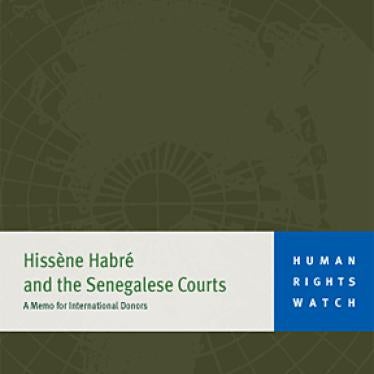(Dakar) - A Senegalese court dismissed torture charges against the exiled Chadian dictator Hissene Habré.
Victims' groups protested the government's attack on judicial independence and immediately announced that they would appeal the Indicting Chamber's decision.
"This is the most important human rights case in Senegal's history and we are behaving like a banana republic," said Alioune Tine of the Dakar-based African Assembly for the Defense of Human Rights (RADDHO). "Sacking and promoting judges in the middle of a sensitive case are shenanigans unworthy of Senegal's democracy."
"We will appeal this wrongheaded ruling," said Reed Brody, Advocacy Director of Human Rights Watch, one of the organizations which initiated the criminal action against Habré in January. "Today's decision and the bizarre maneuvers surrounding it are a slap in the face to Habré's victims who sought justice in Senegal."
On Monday, it was announced the Superior Council of the Magistracy (Conseil superieur de la magistrature), presided by Senegal's President Abdoulaye Wade and his minister of justice, had removed Judge Demba Kandji, who in February had indicted Habre, from his post as investigating judge. Just as Habré was regarded as an "African Pinochet," Kandji was Senegal's equivalent of Spanish judge Baltasar Garze, and his transfer was seen as a way for the government to block Kandji's continuing probe.
It was also disclosed that Indicting Chamber President Cheikh Tidiane Diakhaté who delivered today's dismissal ruling, had been promoted to the State Council (Conseil d'Etat) while his court was deliberating the matter.
The judicial transfers were ordered in an unscheduled meeting Friday of the Superior Council of the Magistracy.
In today's decision, the three-judge Indicting Chamber ruled that Senegal had no jurisdiction to pursue charges that Habre was guilty of massive torture during his 1982-1990 rule in Chad because the crimes were not committed in Senegal.
Human rights organizations said that the decision flouted Senegal's obligation under the 1984 United Nations Convention against Torture, which Senegal ratified in 1986, to prosecute alleged torturers who enter its territory. Under the Senegalese constitution, international treaties, once ratified, override Senegal's legal code.
Activists charged that since Wade's election in March, the Senegalese government has been trying to undermine the case. On January 28, under the previous government of President Abdou Diouf, assistant state prosecutor Abdulaye Gaye had given his formal approval to the prosecution of Habre. In May, however, assistant state prosecutor, Francois Diouf, called for the dismissal of the charges.
President Wade appointed Habré's lawyer, Madické Niang, as a special legal advisor. On May 25, however, the Senegalese Bar Association ruled that Niang could not continue to appear before the courts while serving with Wade. Wade responded by naming Niang as a paid judicial consultant to the government, which the activists described as a "subterfuge."
"The Senegalese government has made a complete about-face on this case," said Brody of Human Rights Watch. "It needs to explain to the world what is going on here."
Today's decision also follows an intense lobbying and media campaign by Habré, who has reportedly spent lavishly in an effort to have the case dropped. The ruling was initially set for June 15 but was postponed until June 20 and then postponed again until today.
"The court could have applied the Senegalese constitution and the Torture Convention," said Tine of RADDHO "Instead it bowed to political pressure. It's a disgrace. But we are not giving up."
The victims will now appeal the decision to the Cour de Cassation, Senegal's court of final appeal. In the meantime, however, the restrictions on Habré's movements could be dropped and he might be free to flee the country.
On February 3, Judge Kandji, the chief investigating judge of the Dakar Regional Court, indicted Habré as an accomplice to torture, and restricted his movement to his Dakar neighborhoods. It was the first time that a former African head of state had been indicted for atrocities by the courts of another country. Kandji was planning to visit Chad to collect more evidence.
Sixty Chadian victims are acting as private plaintiffs in the case as well as one Frenchwoman whose Chadian husband was killed by Habré's regime and the Chadian Association of Victims of Political Repression and Crime (AVCRP), which represents 792 victims of Habré's brutality.
In February, Habré's lawyers moved to have the case dismissed, arguing that Senegalese courts had no jurisdiction over crimes committed in Chad and that the prosecution was barred by the statute of limitations.
Chadian groups also reacted harshly to today's ruling. "This is a dark day for Chad and for Africa," said Delphine Djiraibe, President of the Chadian Association for the Promotion and Defense of Human Rights (ATPDH). "But facts are stubborn things and the evidence of Habré's crimes is finally being presented to the courts and to the world. Hissene Habré has not seen the last of his victims."
A 1992 Chad truth commission report accused Habre and his government of 40,000 political murders and systematic acts of torture and brutality. The truth commission president, Mahamat Hassan Abakar, presented his findings in May to Judge Kandji.
Habré, 57, took power in Chad in 1982, overthrowing the government of Goukouni Wedeye. Habré's one-party regime, supported by the United States and France, was marked by widespread abuse and campaigns against the ethnic Sara (1986) Hadjerai (1987) and the Zaghawa (1989). Habré was deposed in December 1990 by current president Idriss Deby, and has lived in Senegal since.






